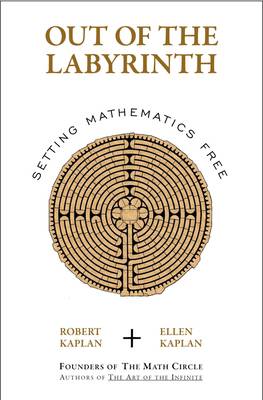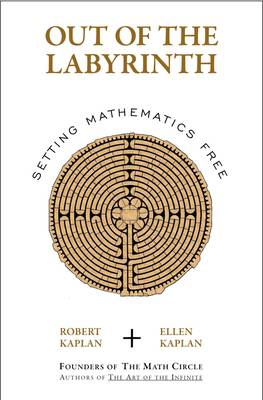
- Afhalen na 1 uur in een winkel met voorraad
- Gratis thuislevering in België vanaf € 30
- Ruim aanbod met 7 miljoen producten
- Afhalen na 1 uur in een winkel met voorraad
- Gratis thuislevering in België vanaf € 30
- Ruim aanbod met 7 miljoen producten
Zoeken
€ 27,45
+ 54 punten
Omschrijving
Who hasn't feared the math Minotaur in its labyrinth of abstractions? Now, in Out of the Labyrinth, Robert and Ellen Kaplan--the founders of The Math Circle, the popular learning program begun at Harvard in 1994--reveal the secrets behind their highly successful approach, leading readers out of the labyrinth and into the joyous embrace of mathematics.
Written with the same wit and clarity that made Robert Kaplan's The Nothing That Is an international bestseller, Out of the Labyrinth offers an engaging and practical guide for parents and educators, and a delight for anyone interested in sharing the pleasures of mathematics. The Kaplans begin by describing the state of modern math education--the lockstep acquisition of "skills," "number facts," and "mad minute" calculations. Instead, they argue, math should be taught as the highest form of intellectual play, an endeavor to be explored and enjoyed by children (or adults) of any age. One by one, they dismantle the many barriers to appreciating mathematics, from the self-defeating belief that mathematical talent is inborn, to the off-putting language of mathematics, to the question of why anyone should care. They show, for instance, that mathematical ability is not a matter of inborn genius, but of doggedness and attention. Even Einstein admitted that "I know perfectly well that I myself have no special talents. It was curiosity, obsession, and sheer perseverance that brought me to my ideas."
Enhanced throughout with puzzles, practical equations, and colorful anecdotes from their own classrooms, Out of the Labyrinth will delight readers with its engaging exploration of mathematics. It will allow students, parents, teachers, and others to wrestle with the accessible mysteries of math--and discover their inner math genius.
Written with the same wit and clarity that made Robert Kaplan's The Nothing That Is an international bestseller, Out of the Labyrinth offers an engaging and practical guide for parents and educators, and a delight for anyone interested in sharing the pleasures of mathematics. The Kaplans begin by describing the state of modern math education--the lockstep acquisition of "skills," "number facts," and "mad minute" calculations. Instead, they argue, math should be taught as the highest form of intellectual play, an endeavor to be explored and enjoyed by children (or adults) of any age. One by one, they dismantle the many barriers to appreciating mathematics, from the self-defeating belief that mathematical talent is inborn, to the off-putting language of mathematics, to the question of why anyone should care. They show, for instance, that mathematical ability is not a matter of inborn genius, but of doggedness and attention. Even Einstein admitted that "I know perfectly well that I myself have no special talents. It was curiosity, obsession, and sheer perseverance that brought me to my ideas."
Enhanced throughout with puzzles, practical equations, and colorful anecdotes from their own classrooms, Out of the Labyrinth will delight readers with its engaging exploration of mathematics. It will allow students, parents, teachers, and others to wrestle with the accessible mysteries of math--and discover their inner math genius.
Specificaties
Betrokkenen
- Auteur(s):
- Uitgeverij:
Inhoud
- Aantal bladzijden:
- 256
- Taal:
- Engels
Eigenschappen
- Productcode (EAN):
- 9780195368529
- Verschijningsdatum:
- 29/09/2008
- Uitvoering:
- Paperback
- Formaat:
- Trade paperback (VS)
- Afmetingen:
- 145 mm x 224 mm
- Gewicht:
- 385 g

Alleen bij Standaard Boekhandel
+ 54 punten op je klantenkaart van Standaard Boekhandel
Beoordelingen
We publiceren alleen reviews die voldoen aan de voorwaarden voor reviews. Bekijk onze voorwaarden voor reviews.











